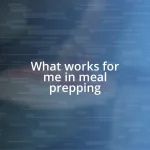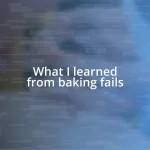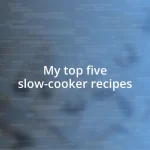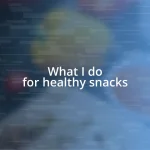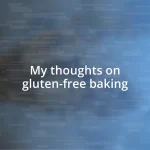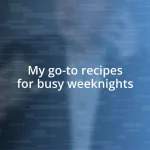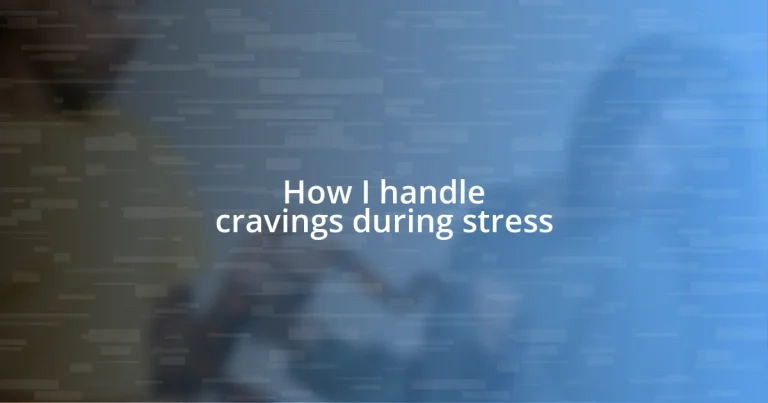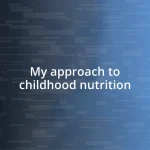Key takeaways:
- Stress and cravings are interconnected; recognizing cravings as signals rather than commands can lead to healthier coping strategies.
- Implementing self-care practices such as mindfulness meditation, physical activity, and journaling helps manage stress and reduce cravings effectively.
- Seeking professional support, whether from nutritionists, therapists, or support groups, can provide valuable insights and accountability in overcoming cravings.
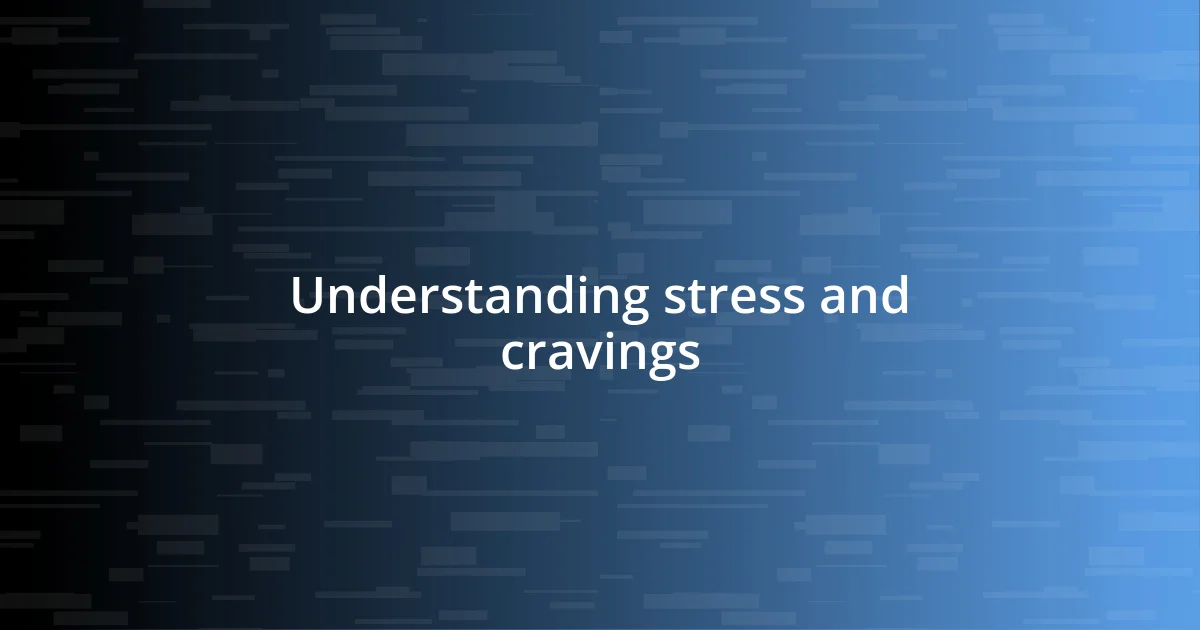
Understanding stress and cravings
Stress and cravings are intricately linked, often creating a cycle that’s hard to break. When I feel overwhelmed, I notice my former habit of reaching for comfort foods like ice cream or chips, which provided a brief escape. It’s fascinating how our brains connect stress with the pleasure of food, right?
I remember a particularly stressful week at work when my cravings hit an all-time high. It was as if my mind was shouting for instant gratification, desperate to drown out the anxiety with something delicious. But I learned that addressing the stress directly was more fulfilling in the long run than succumbing to momentary indulgence, showing me that coping strategies can be far more rewarding than simply giving in.
Have you ever noticed how cravings can almost mimic the feelings of stress? I’ve found that understanding this connection helps me pause and reflect instead of automatically reaching for a snack. By recognizing cravings as signals rather than commands, I’ve begun to explore healthier ways to cope that actually resolve the underlying stress, rather than masking it with food.
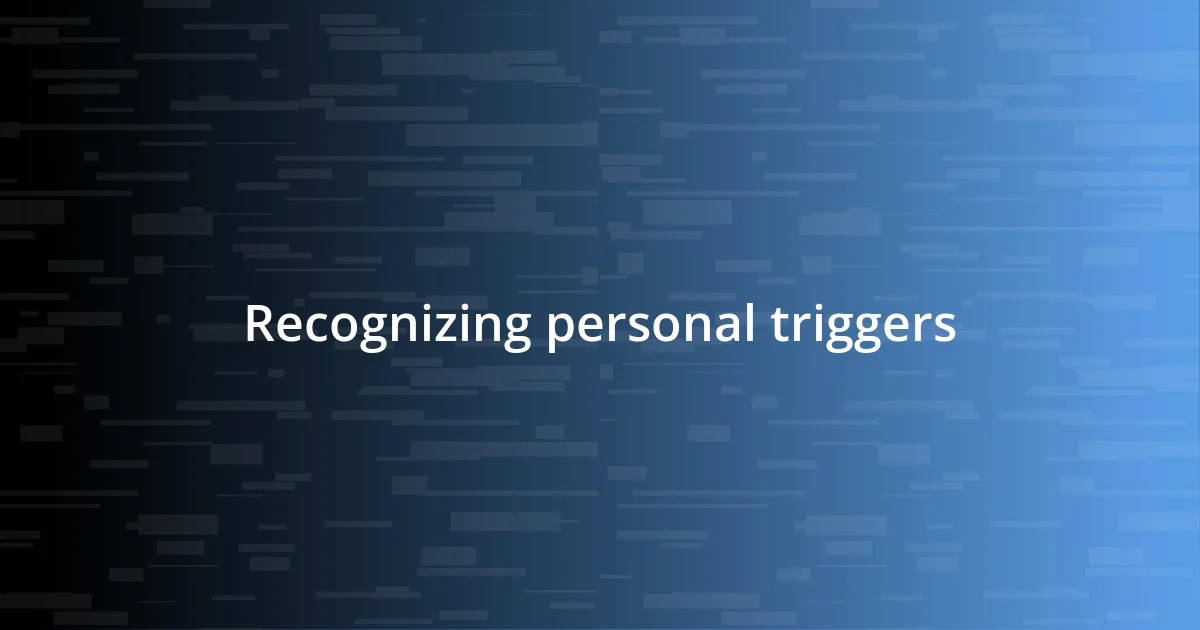
Recognizing personal triggers
When it comes to recognizing personal triggers, I’ve learned that self-awareness is crucial. For example, I noticed that certain situations, like long meetings or tight deadlines, evoke immediate cravings for sugary snacks. It was enlightening to realize that these cravings often served as a stress indicator, prompting me to look deeper into my emotions rather than just reacting with food.
There are times I find myself absolutely craving my go-to comfort food after a tough day. It’s almost automatic, isn’t it? But once I took a step back, understanding that my urge was rooted in feelings of frustration or fatigue, I could develop better coping mechanisms. Instead of reaching for that cookie, I might choose to go for a walk or journal my feelings, which ultimately leaves me feeling more satisfied in a healthier way.
Reflecting on my personal experiences, I’ve discovered that familiarity plays a huge role in my cravings. For instance, after a long day, the thought of plopping on the couch with a bag of chips feels comforting, almost nostalgic. Recognizing this association has allowed me to shift my focus to other activities that provide the same sense of comfort—like curling up with a good book—without involving food.
| Trigger | Response |
|---|---|
| Long meetings | Crave sugary snacks |
| Stressful deadlines | Reach for comfort foods |
| Fatigue | Yearn for indulgence |
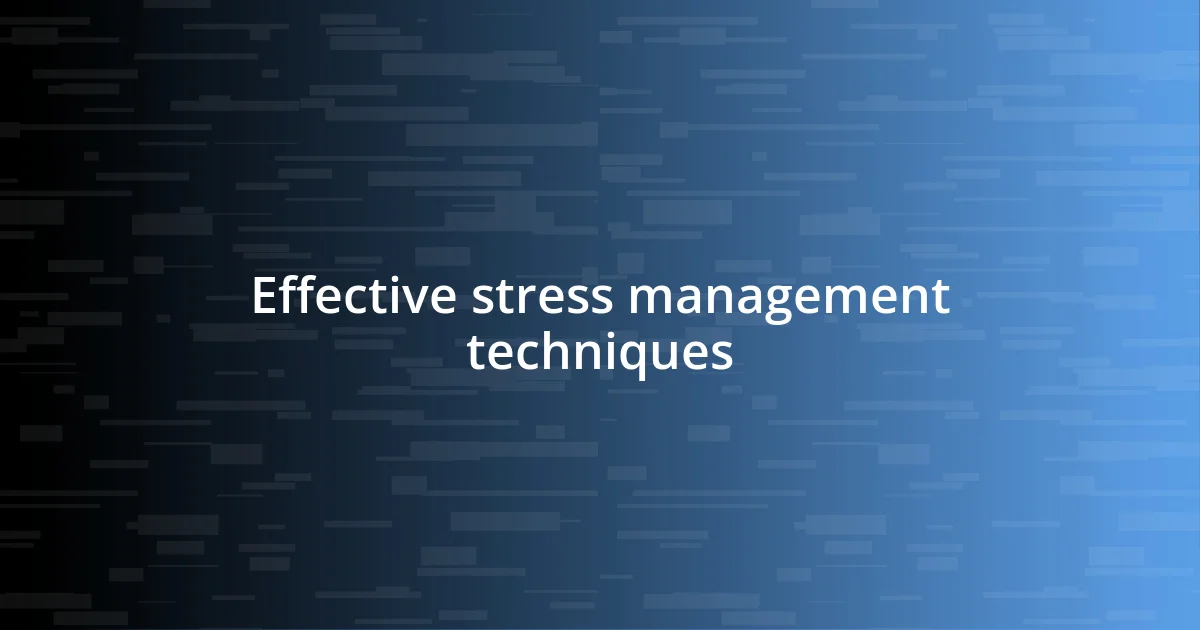
Effective stress management techniques
When it comes to effective stress management, I’ve found that self-care practices make a significant difference in how I handle cravings. For instance, I’ve taken up mindfulness meditation, which allows me to ground myself in the present moment. This isn’t just about clearing my mind; it’s about acknowledging my feelings and creating space to process stress without turning to food for relief. Just last week, during a particularly hectic day, I set aside ten minutes to breathe deeply and focus on my thoughts. It was a game-changer! That small act helped me navigate the stress without indulging in my usual craving for chocolate.
Another technique that I swear by is physical activity. I’ve discovered that even a brisk walk can drastically shift my mood and reduce cravings. When I feel the urge to reach for those comfort snacks, I often lace up my shoes and head outside instead. The fresh air, coupled with movement, clears my head and reminds me that I can find joy in healthier choices.
Here are some effective stress management techniques that I personally implement:
- Mindfulness Meditation: A time-out for my mind helps me reconnect with my emotions.
- Physical Activity: Engaging in exercise, even just a walk, lifts my spirits and curbs cravings.
- Deep Breathing: Focusing on my breath allows me to release tension quickly.
- Journaling: Writing down my thoughts and feelings helps process stress in a constructive way.
- Connecting with Nature: Spending time outside recharges my batteries and refocuses my mind.
Using these strategies not only keeps my cravings in check but also enhances my overall well-being during tough times.
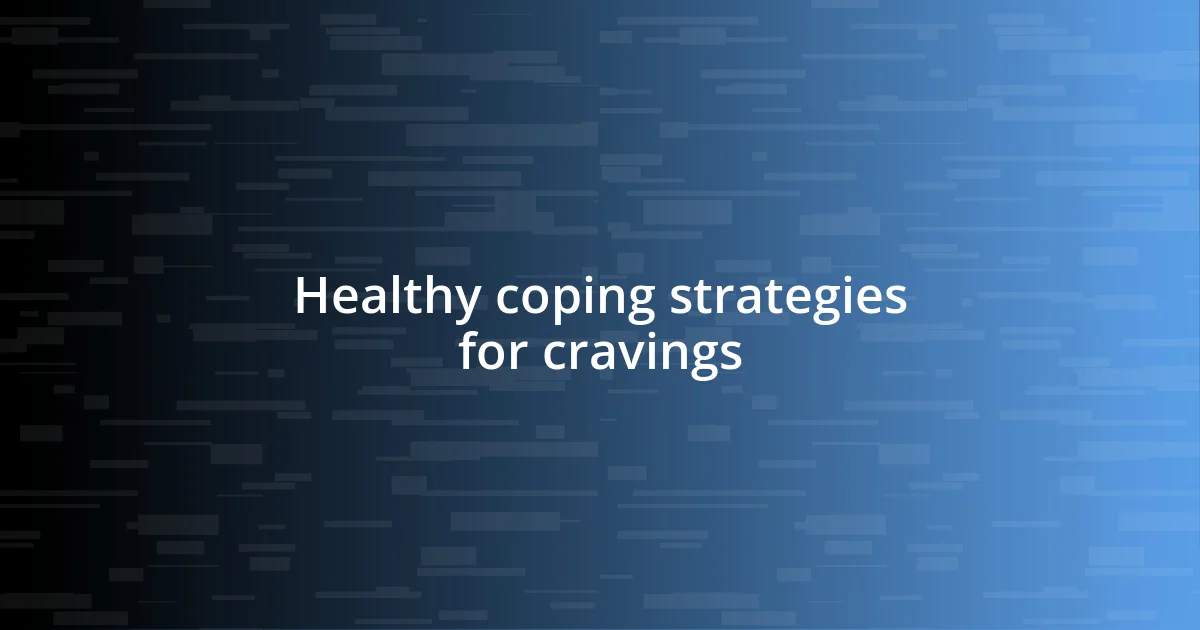
Healthy coping strategies for cravings
Embracing healthy snacks is one coping strategy I’ve found quite effective. Whenever I anticipate cravings creeping in, I prepare by having cut veggies or air-popped popcorn on hand. I remember one stressful afternoon when I swapped my usual chips for crunchy carrots and hummus. The satisfying crunch and vibrant flavors drew me in, making it easier to resist the call of unhealthy options. Isn’t it fascinating how just a little preparation can change the game?
Another approach I’ve discovered is to engage in a hobby that requires my full attention. For me, painting has become a soothing escape. I recall a particularly overwhelming week when I felt the urge to munch while working late into the night. Instead, I set aside thirty minutes to unleash my creativity. Not only did I forget about my cravings, but I also felt a rush of accomplishment and joy. What better way to redirect stress than to pour energy into something that fuels my passion?
Lastly, I find value in establishing support systems. There have been times I’ve called a friend, just to chat and share what I’m feeling. Often, they resonate with my struggles and offer insights or distractions that help me move past my cravings. It’s a reminder that we’re not alone in these battles. Have you considered reaching out—sometimes, a listening ear can be more comforting than a bag of chips?
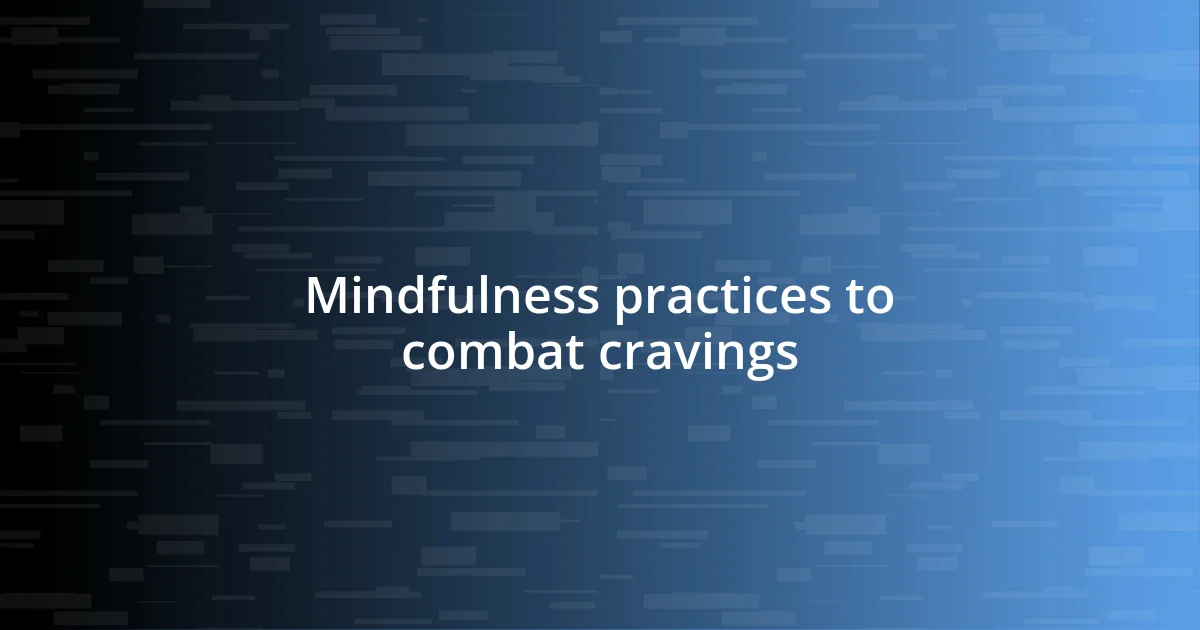
Mindfulness practices to combat cravings
Mindfulness practices have been a transformative part of managing cravings for me. One method I often lean on is deep breathing. I’ve found that taking just a few moments to breathe deeply can anchor me during stressful situations. A couple of weeks ago, when deadlines were looming, I noticed my cravings for sweet snacks escalating. I paused, closed my eyes, and concentrated on my breath. Inhaling slowly and exhaling fully allowed a sense of calm to wash over me, helping to distance myself from the urge to snack mindlessly. Isn’t it incredible how such a simple practice can shift our mindset?
Incorporating journaling into my daily routine has also proven invaluable for understanding my cravings. When I feel overwhelmed, I take a few minutes to jot down what I’m experiencing. For example, one evening, after an exhausting day, I started writing about my feelings instead of heading straight for the pantry. As I put pen to paper, I uncovered that my cravings were often linked to stress and not hunger. This realization made me more aware, enabling me to choose healthier responses instead of automatically reaching for food. Have you ever considered how powerful it can be to express your thoughts instead of suppressing them?
Another approach I’ve embraced is connecting with nature. On days when I feel cravings peeking around the corner, I step outside for a brief stroll. There was a time last month when I was stressing over personal matters, and the pull toward junk food was strong. So, I took my dog for a walk in a nearby park, allowing the fresh air and sunlight to envelop me. As I strolled, I absorbed the beauty of the trees and the sound of birds chirping, which quickly shifted my focus away from cravings. It’s a simple reminder that the world around us can provide the peace we might seek in food. Have you experienced that change of perspective just by stepping outside?
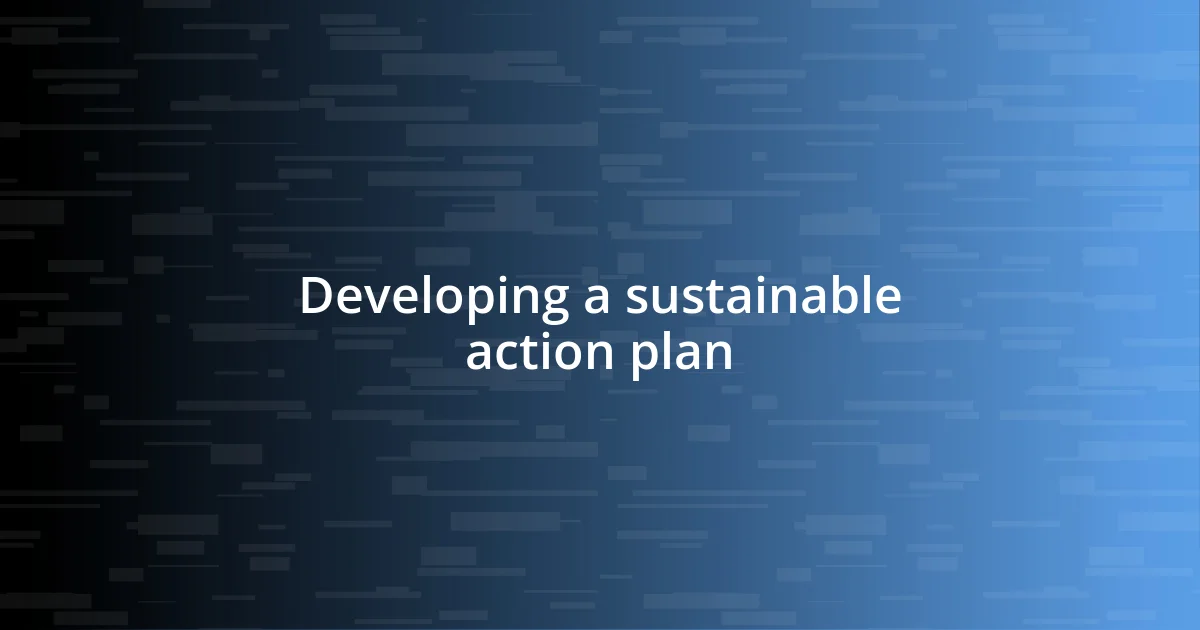
Developing a sustainable action plan
Developing a sustainable action plan involves setting realistic goals that align with your lifestyle. I remember a time when I aimed to cut out all snacks, which led only to frustration. Instead, I learned to create a balanced approach, like designating one day a week to treat myself. This way, I can indulge without derailing my progress. Have you ever noticed how moderation can lead to a more satisfying relationship with food?
Another essential step for me has been tracking my progress, which can be incredibly motivating. I keep a journal where I celebrate small victories, like choosing a healthy snack over chips or successfully managing a craving. Just last month, I reflected on how far I’d come, and it felt empowering to see my growth. It made me wonder: how often do we overlook our achievements in the pursuit of bigger goals?
Lastly, establishing a contingency plan for high-stress periods has been a game changer. When I anticipate a challenging week, I prepare by batch cooking healthy meals and snacks that are easily accessible. I recently found that prepped meals kept me grounded during a hectic workweek. Having nutritious food ready when stress hits means I can focus on coping instead of automatically reaching for unhealthy options. What strategies have you found effective in preparing for those inevitable stressful moments?
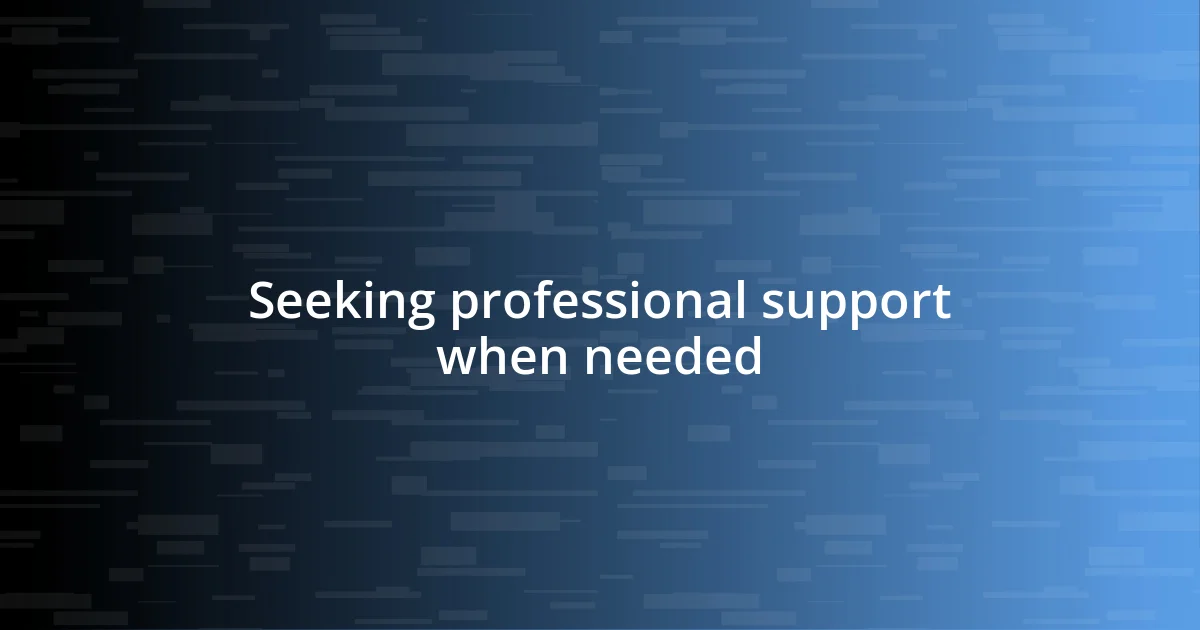
Seeking professional support when needed
Seeking professional support can be a crucial step when craving becomes overwhelming. There was a period in my life when the stress was so intense that cravings felt like they were controlling me rather than the other way around. I decided to reach out to a nutritionist. During our sessions, I learned not just about food but about the deeper emotional connections I had with it. Has there ever been a time when you felt lost in your cravings and unsure where to turn?
Talking to a therapist also provided me with new tools to understand the emotional roots of my cravings. I vividly recall discussing a particularly stressful month at work, where my sweet tooth was acting up like never before. The therapist helped me see that my cravings were often a coping mechanism for deeper feelings of stress and anxiety. In taking this step, I recognized that seeking help is a sign of strength, something often overlooked. How would your behavior change if you knew someone was there to support you through your cravings?
Lastly, participating in a support group added a layer of accountability I didn’t realize I needed. One evening, while sharing my struggles, I was surprised to find others facing similar battles. It felt like a collective sigh of relief—each story resonated with my own experiences. We exchanged tips and encouragement, making the journey feel less isolating. How reassuring is it to know you’re not alone in this struggle? Seeking professional support can transform not just your cravings, but your overall relationship with food and stress.
